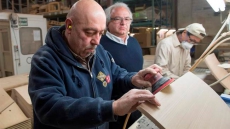VANCOUVER — When Bobbi O'Shea sued the City of Vancouver and four police constables for binding her feet together and tethering them under a jail door, she hoped her case would end the practice.
Instead, the mother of four fears nothing will change now that a judge has ruled the police were justified in using the restraint device.
"I know it's going to happen again," said O'Shea. "It's too bad that there are going to be more individuals who are going to have to suffer what I suffered."
But she said she was pleased there would be at least "some awareness" of wrongdoing. The judge found the city liable for a breach in her standard of care and awarded her $9,000 in general damages in a decision released to the media Thursday.
The trial heard that O'Shea called 911 after suffering an anxiety attack from smoking crack cocaine in 2008. She expected to be taken to hospital but instead was detained in Vancouver's jail, where guards alleged she was unco-operative and placed her in the device, called a hobble.
She said she felt like she was being "tortured" while held for an hour in the hobble, a nylon strap that is wrapped tightly around the ankles, pulled under a closed door and tethered to an object outside.

Provincial Court Judge Laura Bakan ruled that although the use of the hobble was justified to monitor O'Shea's safety, the situation shouldn't have escalated to the point where it was needed.
Bakan found that the officer in charge of the jail failed to communicate information he had about her medical history to other guards, including that she suffered from anxiety, depression, asthma and a cold.
This led to the guards' failure to "take into account her medical and emotional problems, resulting in an escalation of her anxiety," she wrote.
O'Shea told the trial that she covered up a cell window with toilet paper to stop a male guard from seeing her use the toilet, prompting an officer to cuff her hands behind her back. After she moved her hands to her front repeatedly to wipe her badly running nose, she was placed in the hobble.
The judge said in her ruling that the officer should have followed the policy for people who are arrested for public intoxication and brought O'Shea to see a nurse immediately after her arrival at jail.
Bakan accepted that O'Shea felt "much pain" from the device, but did not find any assault or battery occurred or that officers intended to cause her pain or punishment.
She dismissed the action against the four constables, instead finding the city vicariously liable for the breach of standard of care.

Pivot Legal Society lawyer Doug King, who represented O'Shea, said it was unfortunate the decision did not come down harder on the use of the hobble.
"I don't feel like it sent the strong enough message about restraint devices and how dangerous they can be, and how horrible they are for the people in them," he said.
He said Victoria Police stopped using the devices after a 15-year-old girl won $60,000 in a lawsuit against the department in 2008.
Vancouver Police Const. Brian Montague said unfortunately police are required to use the hobble from time to time. There are cases where someone is intent on harming themselves or others or exhibiting uncontrollable violent behaviour, he said.
"Any restraining device is used to help ensure not only the safety of officers, but the safety of the person in our custody," he said.
He said the VPD will review and examine the decision to determine if any changes to practices, policies and procedures are needed.

After her release, O'Shea began using crack cocaine heavily and became homeless for about a year. She's clean now and lives with her children, but said she suffers from post-traumatic stress disorder.
"I don't think it'll ever totally go away," she said. "I'll always be leery of the police. I'll always be untrusting, for the rest of my life."





